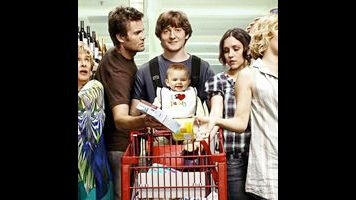You may wonder how Burt and Virginia had come to spend so much time making themselves comfortable in a rich stranger's bathroom. It turns out that Sabrina is self-exiled from the upper class, and the rich stranger who had inexplicably hired Burt to skim his pool was Sabrina's father, blessedly played by Stephen Root. The level of cartoon opulence in which Sabrina's father lived made it look as if last week's tribute to Sherwood Schwartz was now an ongoing thing. The coolest thing about the episode was the way Root, instead of being horrified or even sniffy at having all this white trash on his lawn, acted as if he was a retired long-haul trucker who'd happened to pick the right Lotto numbers. (How he'd made his millions was never made clear. I was hoping for a line revealing that he was in fact Jimmy James' twin brother, and that he'd been given a handsome cash settlement in exchange for his agreeing to stay the hell away.) When Root caught his tacky new friends worshipping his throne and decided to gift them with their very own Japanese super-toilet, there was no hint of anything condescending in it; it was just his way of being neighborly. For all his riches, he was a man who knew something about loss. Not only did his daughter give him the cold shoulder, but there had apparently been some unpleasantness with his wife. When first seen, he was out on the lawn, skeet shooting with her possessions. "You know what would be fun?" he said, after giving it some thought. "Shooting the china with the gun that killed Lincoln."
Root aside, the revelation of Sabrina's background seemed to come out of the blue, and it led the show, as Bill Murray used to say to Dustin Hoffman, into a whole weird area. When Sabrina brought Jimmy along to the big party at her dad's house with all the rich stiffs whose way of life she had forsaken, the joke seemed to be that the rich stiffs were perfectly pleasant and not at all snobbish or rude. The only bad manners on display were those of Sabrina, who waded right in with the snide insults referring to people's past drug use and plastic surgery history. So far as subverting expectations goes, it wasn't a bad approach, but it didn't come across as especially funny, partly because the rich stiffs really were rich stiffs. They may have been nicer than most rich stiffs in sitcoms, but they were still boring as hell, and there was no indication they were meant to be packing remarkable inner lives. When Jimmy pulled Sabrina away and called her out on her mean jokes, he seemed to be scolding her for livening up the party.
That was bad enough, but there was worse to come. In the course of performing an emergency, rapid-fire therapeutic analysis of Sabrina, Jimmy divined that she was actually so mean to her rich friends because, deep down, she thinks they're better than she is, and what's more, she thinks that she's better than the working class folks she's chosen to live and work alongside, and she's not. Come on, said Sabrina, what about Frank? Nope, said Jimmy, "You're smarter and less creepy than Frank", but not better. It's hard to say which made for queasier viewing: watching poor Shannon Woodward try to reshape the sunny, ironic-minded, ambitious working-girl character she's been building for a year, in light of this seemingly contradictory new information about her background, or the lack of anger in nice-guy Jimmy over the news that the girl he's had a crush on all this time has secretly been regarding him, his family, and his friends as the losers with whom she's been slumming. The fact remains that Sabrina really is much smarter than the other working class characters around her, and by stripping her status as a self-made woman away from her, the show seems to be endorsing the idea that you do have to come from money to not be a rubberhead. I can't imagine that was the intent, but this ended up being the first episode of Raising Hope that has left me feeling that the show was taking a condescending attitude toward its characters because of their economic background.
In the end, Jimmy the human puppy dog guilt-tripped his friend the runaway heiress into putting away her snark gun and having open-hearted dopey fun with her boring, sweet plutocrat pals, while back on the home front, his parents were coming to the rueful but good-natured conclusion that tramps like them were not born to funk up the bathroom in true plush comfort. It's happy endings like this that give class warfare a good name.
Stray observations:
- I get the impression that, perhaps as part of some larger campaign to demonstrate audience accountability, Maw Maw's dementia has been dialed back. Even when she was freeing a live lobster because she thought it was a toy, she just seemed very confused more than outright crazy. This is another of those "humanizing" developments that actually seem to make things crueler, even as they also make things less funny.
- "Do you know what it's like to be the only one of your friends whose legs are too stocky to stick to the velcro wall?"
- Nice cameo: Eddie Steeples, of My Name Is Earl, in his recurring role as the much-employed Tyler.
- Great cameo: the cast of Yo Gabba Gabba!, who one well-heeled mom hires to hang out with her daughter because "we don't allow Madison to watch TV."

 Keep scrolling for more great stories.
Keep scrolling for more great stories.
